Advertisement
commentary
The College Cheating Scam Was Pointless. Rich White Kids Don’t Need Elite Schools

The most ironic thing about "Operation Varsity Blues" — the college cheating scandal that has mercifully pushed Bob Kraft out of the headlines — is that it was pointless. At least for well-off whites, the data are quite clear: It doesn’t matter whether you go to an elite college or not. What matters is how well you do at the college you attend.
It’s a dirty secret that the Ivies and their ilk would rather not trumpet. And it probably comes as a surprise to suburban high-school juniors and seniors who’ve spent their scholastic careers panicking over grades and desperately plumping up their resumes with all manner of sports and clubs.
But it’s true.
To be sure, graduates of, say, Harvard tend to earn more than their peers who attended other, lesser-known schools. But that’s not because a Harvard education is so fantastic. Rather, it reflects the fact that Harvard admits students who have performed at the top of their class. They’re smarter, harder-working, more driven and more talented than their fellow students. It should be no surprise that after college they go on to do great — or at least, lucrative -- things. But Harvard’s impact on their life is actually pretty small.
Harvard’s impact on their life is actually pretty small.
Within education circles, this is pretty well known. Way back in 1999, economists Stacy Berg Dale and Alan Krueger looked at the impact of elite versus non-elite colleges on life outcomes. Assume, for example, there are two similar students, both with good grades and SAT scores of 1500. One goes to an Ivy; the other goes to a decent but decidedly not elite school. The result? “[S]tudents who attended more selective colleges do not earn more than other students who were accepted and rejected by comparable schools but attended less selective colleges,” concluded Dale and Kreuger.
Indeed, having attended one of those elite institutions, I found the actual education was often lacking. Well-paid celebrity professors delivered lectures in large halls while barely compensated teaching assistants did the actual teaching. Meanwhile, smaller schools of lesser renown trumpet the quality of their education: better teacher-student ratios, personalized attention, counseling and career assistance. Perhaps they do so because that becomes their selling point. The elites — valued merely because they are elite — don’t have to try so hard.
Moreover, the list of those who have done well yet attended less-known schools is long. Oprah Winfrey went to Tennessee State University. Joe Biden went to the University of Delaware while Elizabeth Warren went to the University of Houston. Google co-founder Sergey Brin got his B.S. from the University of Maryland. Billionaire investor Warren Buffet was graduated from University of Nebraska–Lincoln. Heck — the number of folks who did well despite being college dropouts is itself striking, including Bill Gates (Harvard) Mark Zuckerberg (Harvard again), Steve Jobs (Reed College), Michael Dell (University of Texas at Austin) and Boston’s own John Henry (Victor Valley College and the University of California).
[T]he cheaters ended up bumping others -- namely, those from needier backgrounds -- who might genuinely have benefitted ...
There are, however, exceptions to Dale and Kruger’s findings that underscore the awfulness of the college cheating scandal. It turns out that the eliteness of a college does, in fact, matter for certain subgroups, such as minority students and those who come from poorer backgrounds. That’s not because the education at the elite schools is superior. Rather, by mixing with other well-connected students, those from disadvantaged backgrounds are exposed to more career opportunities and to extensive alumni networks.
In addition, there’s also evidence that an elite college can benefit women’s earnings. Again, though, it’s not because of the excellence of the education. Instead, apparently, women who attend more elite colleges tend to get more advanced degrees, marry later, and stay in the workforce longer.
But none of these exceptions apply to the well-off folks embroiled in the cheating scandal.
Perhaps Felicity Huffman, Lori Loughlin and the many others caught in the fed’s dragnet don’t read economists and actually thought their kids needed to go to an elite school in order to succeed. Or perhaps their concerns were less about their kids and more about themselves — they wanted bragging rights. Either way, by undeservedly getting their children into elite colleges, the cheaters ended up bumping others — namely, those from needier backgrounds — who might genuinely have benefited from that experience.
And then, of course, there’s the whole jail thing. The wealthy and entitled, it turns out, don’t always make the best decisions.
